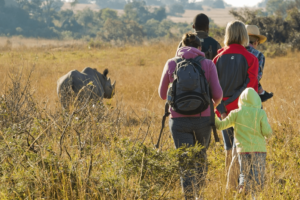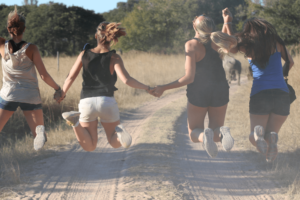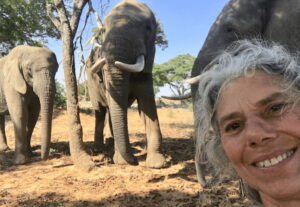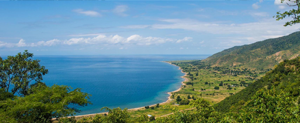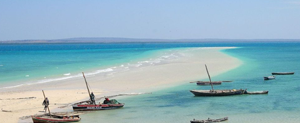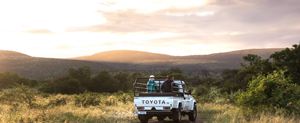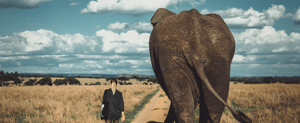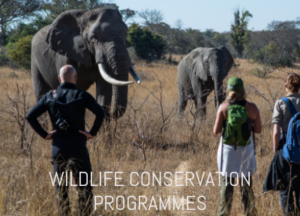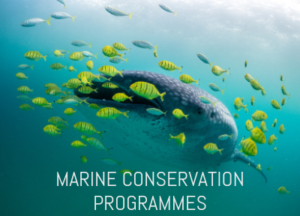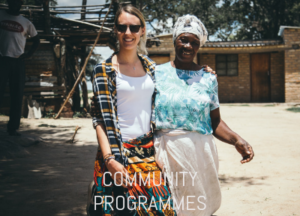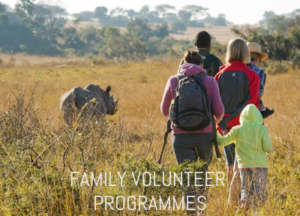Travelling solo in Africa, especially as an independent women traveller, requires some good travel hacks! Here we share some of our best, whether you’re volunteering or taking a solo adventure. We wish we’d known of a few of them before our own travels too!
As a team we have visited or worked in more than 50 countries, and over the years we’ve got a good few things to share about solo travel in Africa which will keep you safe, make sure you don’t offend anyone and get you into people’s good books straightaway!
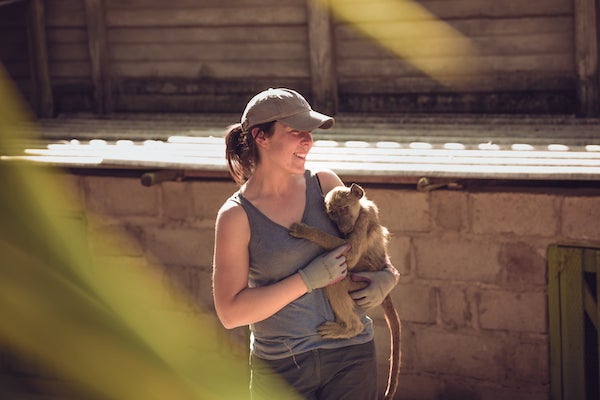
1. Plan ahead and be safe.
Covid-19 or otherwise, safety is the obvious first consideration for solo women travellers. By taking a few simple steps you can really minimise the fear of solo travel and have a wonderful experience post coronavirus.
- Book your first night’s accommodation in advance and aim to arrive by mid-afternoon at the latest. This saves the hassle of arriving and wandering aimlessly around with your luggage trying to find somewhere to stay.
- Always try to travel during daylight hours if you’re relying on public transport. We’ve usually found that taxis booked through your accommodation can be more reliable (and usually know where they’re going!).
- Firmly establish your airline, destination country and accommodation’s Covid-19 protocols – where and when do you have to wear masks; is there a curfew; what sanitising and hygiene procedures are in place at your accommodation. Pack extra masks, hand sanitiser and wipes in your hand luggage.
- Make sure your travel insurance covers everything you want to do and that there is cover in place for Covid-19 related issues you might encounter. One of the most comprehensive insurance policies is from Trailfinders, which includes cover for Covid-19. Find out more here.
2. Pack a door stop.
Lots of backpackers and hostels don’t have locks on the inside of doors and you never really know who might have a key to your room. Pop your doorstop under the door (on the inside obviously) and no-one can make a midnight visit. This obviously assumes the door opens inwards and it’s not a dormitory. Supplementary hot tip: don’t forget the doorstop when you need to go to the toilet in the middle of the night and panic when you can’t get your door open.
3. Be modest not trendy.
Those short shorts that you love? Leave them behind unless you’re going to the beach. Blend in – generally try and dress modestly and avoid looking like a tourist – this might mean you don’t look your best or you aren’t dressed in clothes designed for great tanning or for dream selfies, but being inconspicuous is never a bad thing. In general, African women dress smartly and modestly and, in any case, those teeny ween shorts and strappy vest aren’t terribly appropriate when you’re trying to hack down invasive plant species in the middle of the bush. Or when you’re trying to look after a wriggly baboon. If you’re going on a community service or teaching project, or visiting a rural community – cover your shoulders and wear long shorts or a skirt. *Not a mini-skirt.
4. Pack your common sense.
Don’t do things you wouldn’t do normally. When you’re at home do you approach perfect strangers who you meet on the street and follow them to their uncle / cousin / brother’s shop which is up an alley? If you wouldn’t do it at home, think twice before you blindly do it in Africa. Having said that, don’t let fear stop you from having awesome and unexpected experiences – just use your head and that common sense you packed.
5. Bring leggings.
Lots of pairs in lots of colours – you really can’t have too many when you’re traveling. They’re cheap, don’t crumple, they can be dressed up or down, worn on their own or with a skirt or shorts, under your trousers when its really cold and are a good alternative to pyjamas when it’s chilly. Plus they roll up really small.

6. Buy postcards.
Considered somewhat passé now with the advent of social media, but postcards make an awesome journal – buy one, write what you did that day or week, stick it in your bag and wham – instant visual diary for when you get home. And it’s a nice alternative to a slide show for your mum and gran.
7. Use your bra.
It’s a helpful storage place for emergency cash and credit cards. Even your room key, unless its on a piece of wood the size of Texas.
8. Photocopy EVERYTHING.
After scoffing at her American travelling companion a few years ago for wearing all his precious things (credit cards, passport, driving licence) in a “grotesque granny-bag” around his neck, this writer proceeded to have all her important documents stolen from under her feet in an internet cafe. Although this subsequently led to incredible wildlife opportunities, a career change and eventual marriage, it’s not to be recommended.
9. Learn to entertain yourself without using your phone.
Before you set out on your journey, consider some things you’d like to do more or try if you had more time. Sketching, taking photos and journaling can both help you document your experience and fill downtime with hobbies you’d like to pursue instead of just scrolling through Facebook again on your phone. We lead busy lives, usually multi-tasking and planning ahead. To really relax and reconnect with nature, you may want to (or be forced to through lack of internet) back off social media for a while.
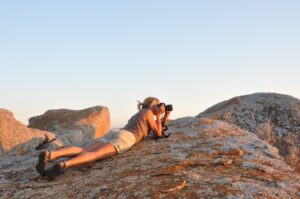
10. Stay local, buy local, meet locals.
We believe a big part of travelling sustainably is about staying in one place and really immersing yourself in that community. This immediately minimises your carbon footprint but also enables you to better understand how your presence can benefit the local economy. Buy local crafts, use local transfer services, eat local food and stay in locally owned accommodation so that profits don’t leave the country (or ideally, the community). Connect with locals – they are the source of incredible stories and knowledge and they will stay with you longer than any other part of your trip.
“As much as I enjoyed volunteering and working to help make a difference, the time we spent with the staff and community are the memories that will stay with me forever. Everyone is so genuine in their teachings and interactions and go out of their way to make every day as special as possible. I loved being a part of what Imire is doing for the animals and community, but the people are the heart of it all.”
– Bethany, USA
Rhino & Elephant Conservation, Zimbabwe
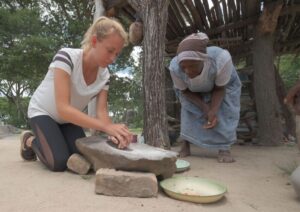
As a team, we’ve experienced the good and bad of solo travel, and the unique experiences that face women who travel alone. Our take on it is, step one – plan, step two – go! Whether you’re a looking for a gap year adventure or are a mature traveller discovering solo travel later in life, there’s nothing quite like experiencing a place at your own pace, doing what you want when you want it.
– – – – – – – – – – – – – – – – – – – – – – – – – –
2021 looks set to be a busy year for travel and it’s definitely not too early to book your place on any of our projects. Even though things are still uncertain, we are offering completely refundable deposits and flexible booking terms to ensure you can book your trip with complete confidence.
Please get in touch for more information about any of our projects or click to book your place!
“Without forward bookings, there may not be safaris left to go on.” – www.safaribookings.com

